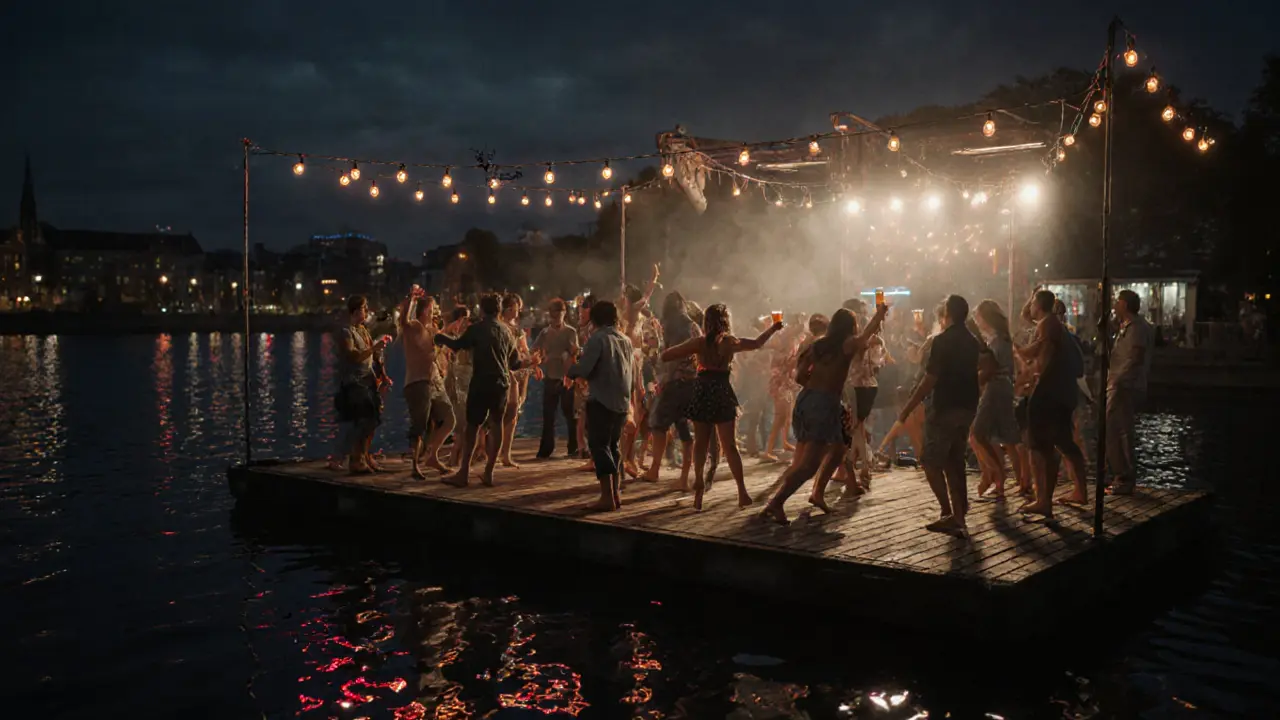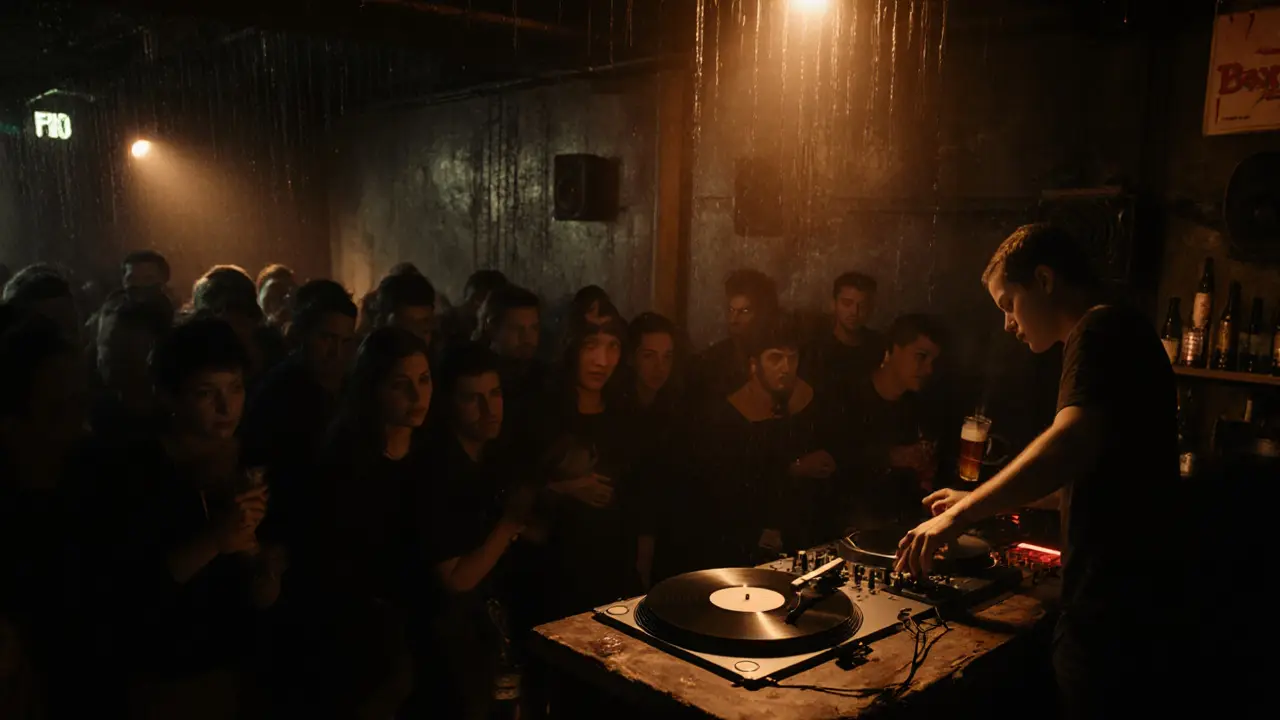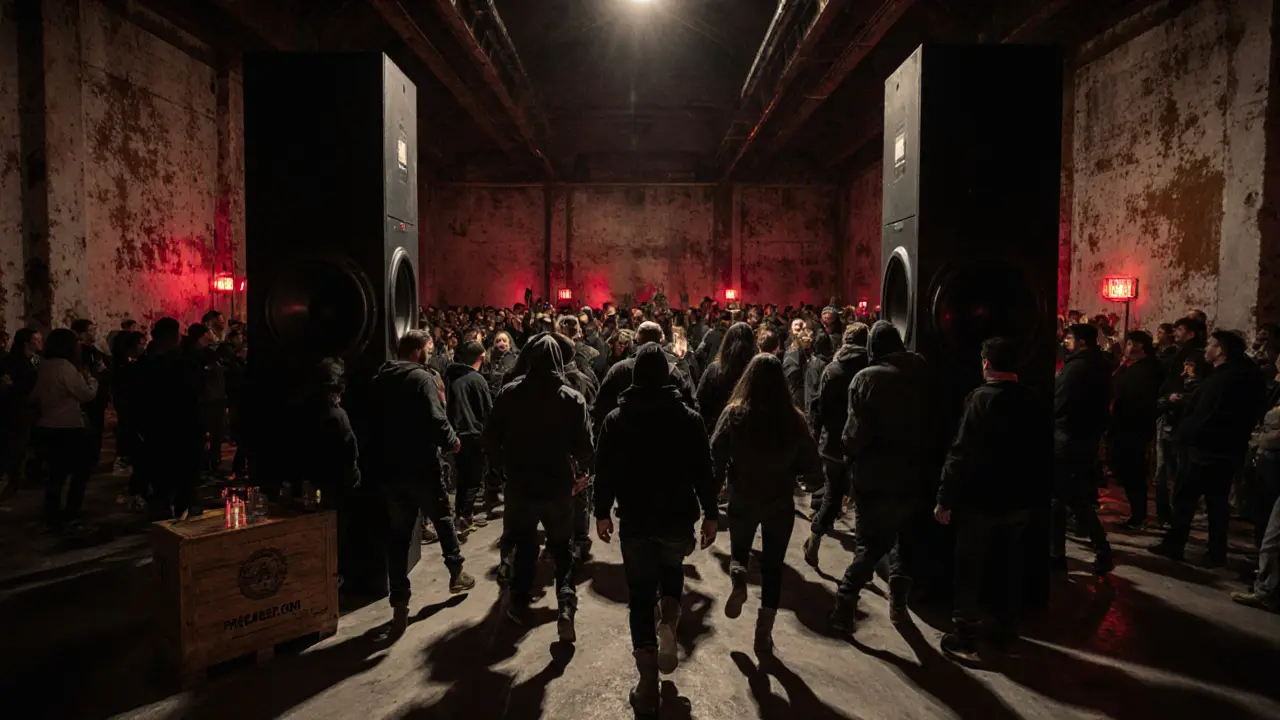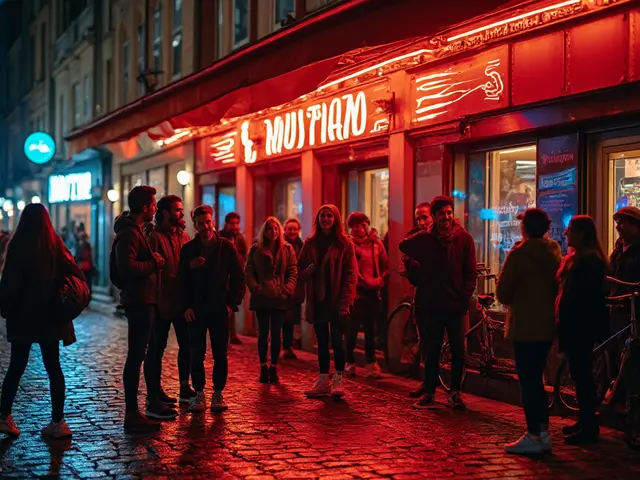
When the sun goes down in Munich, the city doesn’t sleep-it switches gears. While tourists head home after beer halls and bratwurst, locals and visitors with a taste for deeper beats and darker corners know where to go. This isn’t about fancy cocktails and dress codes. It’s about real nights that stretch past 3 a.m., where music isn’t just played, it’s felt. If you’re looking for the real Munich nightlife beyond the Oktoberfest crowds, here are the spots that actually stay open when everything else shuts down.
Praterinsel: The Underground Oasis
Praterinsel isn’t a club. It’s a floating party island on the Isar River. Open since 2018, this converted barge pulls in crowds every Friday and Saturday night with a raw, unpolished vibe. No VIP section. No cover charge before midnight. Just a wooden deck, cheap beer from the tap, and a sound system that drops bass so hard you feel it in your ribs. The crowd? Students, artists, DJs from Berlin, and travelers who found it by accident. The playlist? House, techno, and the occasional punk remix. No one cares what you wear. Shorts and sneakers are fine. The only rule: no phones on the dance floor. They’ve got a lockbox by the entrance. You’ll thank them later.
Backstage: Where the Local DJs Rule
Backstage has been the heartbeat of Munich’s underground scene since 1998. Tucked behind a nondescript door near the main train station, it’s easy to miss. Inside, it’s all concrete walls, low lighting, and a sound system built by a local engineer who spent three years tuning it to match the room’s acoustics. This isn’t a place for Top 40. It’s for techno, minimal, and experimental electronic music. The DJs here aren’t famous on Instagram-they’re legends in Munich’s basement circuit. One night, you might catch a set from a former resident of Berghain. Another night, it’s a 21-year-old producer who only plays vinyl. The bar doesn’t take cards. Cash only. Bring €20 and you’ll be fine until dawn.
Reinbacher: The Industrial Temple
Reinbacher is what happens when a 1950s factory gets turned into a club. The ceilings are 15 feet high. The floor is concrete. The walls still show rust stains from when it was a metalworks shop. It opened in 2016 and quickly became the go-to for fans of hard techno and industrial beats. The crowd here doesn’t dance to the music-they move with it. You’ll see people in work boots and hoodies, heads down, eyes closed, lost in the rhythm. The sound system? Four 18-inch subwoofers and a pair of vintage JBL monitors. The volume? 110 decibels. Earplugs are free at the door. Don’t expect to hear lyrics. You won’t. This is about texture, pulse, and pressure. Open until 6 a.m. on weekends. No dress code. No attitude.

St. Pauli: The Late-Night Jazz Hideout
Not every night needs a thumping beat. If you want to wind down after the chaos, or just prefer something slower, St. Pauli is your spot. It’s a basement bar with worn leather chairs, dim lamps, and a grand piano that’s been played by jazz musicians since the 1980s. The owner, Hans, still pours the drinks himself. He knows everyone’s name by the third visit. Live jazz starts at 10 p.m. and runs until 2 a.m. No cover. No reservations. Just a small crowd of regulars, some students, and the occasional expat who found it on a rainy Tuesday. The cocktails? Simple. Old Fashioned, Negroni, or a house-made gin tonic with local herbs. If you’re tired of noise, this is where you breathe again.
Werkstatt: The Experimental Playground
Werkstatt isn’t a club. It’s a cultural lab. Every Thursday, it transforms from a rehearsal space into a live audiovisual experience. Think projections on walls synced to modular synths. DJs who manipulate live samples with pedals. Performers who dance with light sticks while ambient noise fills the room. The crowd here isn’t there to drink-they’re there to feel. It’s the kind of place where you might see a 70-year-old professor next to a 19-year-old coder, both nodding along to the same strange, beautiful noise. Tickets are €8 and sold at the door. No alcohol on the main floor. Beer and wine are served in a separate room. The music changes every week. You never know what you’ll hear. That’s the point.
Die Kantine: The All-Nighter That Feels Like Home
Die Kantine is Munich’s last true all-nighter. Open from 10 p.m. to 8 a.m., seven days a week. It’s not fancy. It’s not loud. But it’s always full. The bar serves beer, schnapps, and hot dogs until sunrise. The playlist? A mix of 80s new wave, 90s hip-hop, and 2000s indie rock. No DJs. Just a guy named Klaus who’s been spinning records here since 2003. He doesn’t take requests. He plays what he feels. The walls are covered in graffiti from past patrons. The floor is sticky. The air smells like sweat and old beer. But it’s real. People come here after other clubs close. They sit on the bar stools, talk about their lives, laugh too loud, and stay until the sun comes up. It’s not a party. It’s a ritual.

What to Know Before You Go
- Transportation: The U-Bahn stops running around 1 a.m. After that, you’ll need a taxi or ride-share. Uber works, but prices spike after midnight. Consider booking a night bus-Munich’s Nightliner network runs every 30 minutes on weekends.
- Cash is king: Most underground clubs don’t take cards. Bring at least €30. You’ll need it for drinks, door fees (if any), and snacks.
- Age limit: 18+ for most clubs. Some venues like Reinbacher and Praterinsel allow 16+ until midnight, but only with ID.
- Dress code: No suits. No flip-flops. Just wear what you’re comfortable in. Most places don’t care.
- Timing: Clubs don’t really get going until 11 p.m. Arrive before midnight if you want to avoid lines.
What’s Not Worth Your Time
Don’t waste your night at places like Club 23 or Maximilian. They’re crowded, overpriced, and play the same pop remixes every weekend. They’re for tourists who think Munich nightlife means glitter and bottle service. You’ll pay €15 for a soda and stand in line for 45 minutes. Skip it. The real scene doesn’t advertise on Instagram.
Final Tip: Go Alone
The best nights in Munich happen when you’re alone. You’ll notice things you’d miss with a group-the way the bass vibrates through the floor, the quiet smile of the bartender who knows you’re tired, the stranger who dances like no one’s watching. You’ll meet people who live here, not just visit. You’ll find a new favorite spot. And you’ll leave before sunrise, not because you had to, but because you didn’t want it to end.
What’s the best night to go out in Munich?
Friday and Saturday nights are the busiest, but Thursday nights at Werkstatt and Die Kantine offer the most authentic, uncrowded experience. If you want to avoid lines, go on a Thursday. If you want energy, go on Saturday. Praterinsel and Backstage are always packed on weekends, but they’re worth the wait.
Are Munich clubs expensive?
It depends. Tourist clubs charge €15-25 cover and €8 for a beer. Underground spots like Backstage and Reinbacher charge €5-10 cover, if anything. Drinks are €4-6. Die Kantine doesn’t charge cover at all. You can have a full night out for under €30 if you skip the fancy bars.
Do I need to speak German to go to these clubs?
No. Most clubs have international crowds. The music speaks for itself. At places like Praterinsel and Werkstatt, you’ll hear English, Spanish, French, and Polish spoken as much as German. The staff usually speak at least basic English. Just smile, point, and say "Bitte"-it goes a long way.
Can I go to Munich clubs if I’m under 21?
Yes, if you’re 18 or older. Most clubs allow 18+ entry. Some, like Praterinsel and Reinbacher, let 16+ in before midnight. After midnight, it’s strictly 18+. Always carry a valid ID-German police check clubs randomly. No ID, no entry.
What’s the latest I can get into a club in Munich?
Most clubs close between 2 a.m. and 3 a.m. Die Kantine is the exception-it stays open until 8 a.m. Some venues like Reinbacher and Praterinsel allow entry until 1 a.m., but after that, doors close. Don’t expect to walk in at 3 a.m. and find a party.
Are there any clubs open on Sundays?
Yes, but it’s rare. Die Kantine is open every day, including Sunday. Werkstatt sometimes hosts Sunday afternoon sessions with ambient and experimental sets. Most clubs close on Sundays, but if you’re looking for a quiet drink or live music, St. Pauli is open until 2 a.m. on Sundays.


